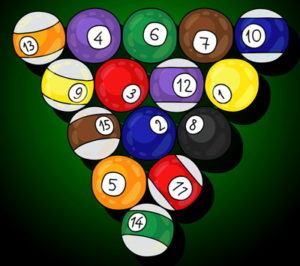 In the world of sports, it’s easy to understand why you wouldn’t succeed in the professional game. Whether it be because of the supreme fitness of footballers, for example, or the exceptional levels of practice put in by tennis players, the difference between the level of the professionals and the average Joe is simple enough to comprehend.
In the world of sports, it’s easy to understand why you wouldn’t succeed in the professional game. Whether it be because of the supreme fitness of footballers, for example, or the exceptional levels of practice put in by tennis players, the difference between the level of the professionals and the average Joe is simple enough to comprehend.
There are some sports, however, where the same cannot be said. Both pool and darts fit into their own category, whereby the majority of people tend to play them in a pub after a few drinks and convince themselves that they could have been professionals if the chips had fallen right for them.
The reality, of course, is that even those games would ask serious questions of people if they made the step up to become professionals. Just because some people think they’d be ‘easy’ to do after playing with some mates doesn’t mean that the levels of dedication are any less serious than the hours put in by basketball players American football aficionados.
We might know the games better, but that does not mean that they’re any less tricky to master than other sports that we play in our own time such as golf or squash. Pool is so much more than just a pub game, after all.
Best Bookie For Pool Betting
William Hill

William Hill stand out from the crowd when it come to betting on Pool. There is no need to search for it in a 'more sports' menu, with the sport prominently displayed in the main menu.
This is the site where you an often find the most advance outright markets before major tournaments and once the events get underway they have the biggest in-play depth of any bookie.
There are no pool specific offers but Hill's have lots of all sports deals and boosts that can easily be used on pool markets to enhance odds or add insurance. Other good options for Pool include any of the big bookies.
Betting On 9-Ball Pool
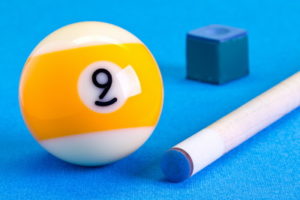 As with any other sport, there are countless different markets available on 9-ball pool, the most obvious of which is pre-tournament betting on which player will win the competition that you’re betting on.
As with any other sport, there are countless different markets available on 9-ball pool, the most obvious of which is pre-tournament betting on which player will win the competition that you’re betting on.
You can also bet on the likes of which player will win an individual match and, if you find a bookmaker that has good depth to their markets, how many games each player will win in a match.
In all honesty, most UK bookies only cover the basics like pre-tournament ante-post betting and which player will win an individual match, so you’ll be lucky to find more markets than that on even the most major competitions.
The History Of Pool
The Game Originated Outdoors

There’s something about the sport of pool that feels quintessentially American, perhaps borne out of films such as The Hustler and The Colour of Money. In actual fact, the game finds its origins in the world of the billiard games played in Europe during the 18th century, yet it will always feel American to most who watch it.
It’s also slightly misleading to speak of ‘pool’ as though it’s just one sport, with the title being an alternative the more correct ‘pocket billiards’ that is something of a catch-all term for any sport played with a cue on a table with six pockets.
The sport finds its origins in an outdoor lawn game with similarities to croquet that was played in France during the 14th century. As with most outdoor games, it was moved inside at some point and the turf of the outside world was represented by the green baize that covered a wooden table.
The French nobility and English gentry soon began to play the game and by the 19th century it was one of the most popular pastimes of those two social groups. The move from the outdoors to the in also saw variations of the game develop, meaning that there wasn’t just one form of the new sport that we can look at.
Early Versions Of Pocket Billiards
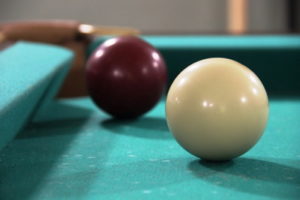 One of the earliest forms of pocket billiards, which is so named because of the addition of pockets to the table as a target or obstacle depending on the form of the sport being played, was played with two balls and would see the players take a ball each and try to pot their opponent’s ball.
One of the earliest forms of pocket billiards, which is so named because of the addition of pockets to the table as a target or obstacle depending on the form of the sport being played, was played with two balls and would see the players take a ball each and try to pot their opponent’s ball.
It wasn’t just limited to two players, either, with up to a dozen able to get involved with their own cue and the balls working in rotation. This could clearly lead to confusion, so coloured dye began to be applied to the balls in order to separate them from each other.
In 1878 the first pocket billiards championship took place and players took part in games of American four-ball billiards. This version of the sport is typically played on pocketless tables and sees two red and two white balls used by the players. They each get one white ball and use it to try to score a point by having their cue ball hit two other balls in the same shot. They get two points if they manage to hit all three of the other balls on the table, whilst hitting just one ball results in the player’s go being over.
The extension of the game came about in the form of 15-ball pool, which saw 15 object balls being added to the table that were numbered from 1 to 15. Each time a player sank a ball into one of the pockets they would win the number of points associated with each ball, meaning that there were 120 points up for grabs.
The first player to rack up 61 points would therefore have an unassailable lead and be declared the winner. Things began to change in 1888 when it was decided that it would be fairer to count the number of balls potted by each player rather than their value, with the player who potted the final ball of the previous rack starting the next one, lending the game the title of ‘continuous pool’.
The Sport We All Know
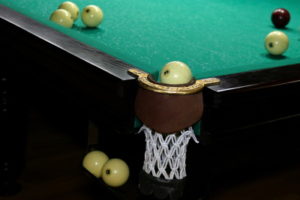 The version of pool that most people associate with the name came around at the turn of the 20th century. The first recorded version of the game took place in 1908 and was known as B.B.C. Co. Pool until around 1925. That’s because the equipment was made by the Brunswick-Balke-Collender Company. Initially the sport involved the use of 7 red and 7 yellow balls, along with a black ball and the cue ball.
The version of pool that most people associate with the name came around at the turn of the 20th century. The first recorded version of the game took place in 1908 and was known as B.B.C. Co. Pool until around 1925. That’s because the equipment was made by the Brunswick-Balke-Collender Company. Initially the sport involved the use of 7 red and 7 yellow balls, along with a black ball and the cue ball.
British pool tables often use this version of the game, whilst in America and elsewhere the more popular version of the sport uses solids and stripes. The balls are numbered in the American version of pool, with the black ball being the final one to be potted and therefore called the 8 ball.
Despite being popular the game didn’t get official rules until 1940. The numbers on the balls in the sold and stripes variation are 1 to 15, owing their origins to the 15-ball game played towards the end of the 19th century.
Other Versions Of Pool
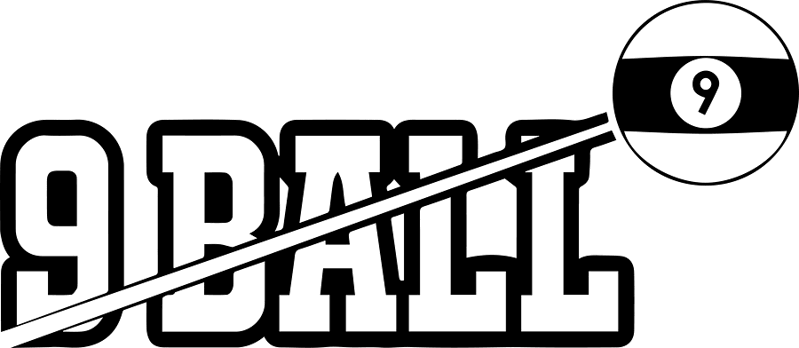
There are two other versions of pool that are worthy of a mention, with the first being straight pool and the second being 9-ball pool. Straight ball sees players aim at any of the object balls that are on the table, with points being earned every time an object ball is potted and no foul is committed.
Depending on the competition in play, competitors are required to get to a specific points total such 100 points, with 125 usually the target in professional straight pool. Players need to indicate both the ball they’re aiming for and the pocket that they hope to pot it into, continuing until they commit a foul.
9-ball pool can trace its origins to the United States of America and the 1920s. It is a more fast-paced variation of the game and is normally played by two players going one-on-one, but can actually be played by any number of players.
There are different versions of 9-ball pool, so the rules in-play tend to be agreed either by the competitors or else the organisers before the game gets underway. In the modern era, 9-ball pool is the one used for competitions organised by the likes of the World Pool-Billiard Association, the United States Professional Poolplayers Association and the Women’s Professional Billiard Association.
The Demise And Rescue Of Pool
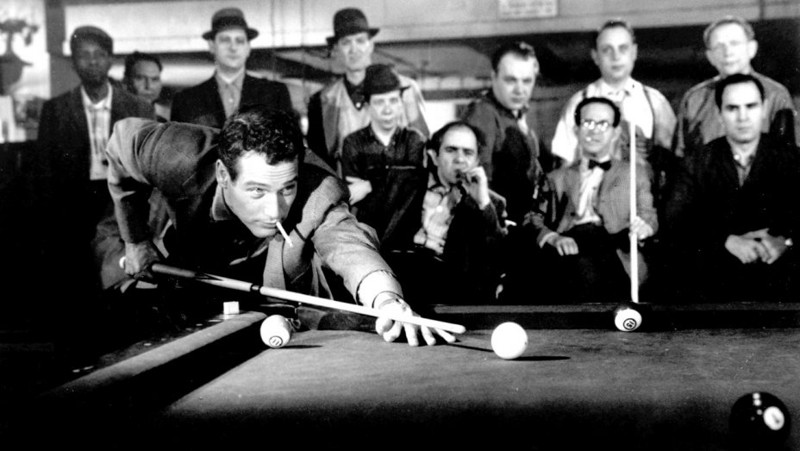
Pool as a sport enjoyed its zenith in the years before the outbreak of the Second World War, but in the wake of the war’s conclusion the game began to loose its lustre. Its return to prominence came about thanks not to competitive play but rather thanks to a movie.
Paul Newman’s appearance in the black-and-white film The Hustler in 1961 led to an explosion in the desire of people to play to game for the first time since the pre-war years, resulting in new pool rooms being opened all around the United States.
The excitement for the sport was somewhat short-lived, chiefly because of the outbreak of the Vietnam War meaning that social concerns began to take over the mindset of those that were most likely to have the game aimed at them.
Indeed, the decline continued until the release of The Colour Of Money in 1986, in which Tom Cruise played an up-and-coming pool player who learnt the art of the hustle from Paul Newman’s character. That led not only to the return of the game but also to a neatening up of its image, with the pool rooms that opened as a result being far more upscale than those that has been opened in the 1960s.
Where Does The Name ‘Pool’ Come From
 The term ‘pool’ as a title for the game came about because the tables were added to gambling parlours in America in the 19th century.
The term ‘pool’ as a title for the game came about because the tables were added to gambling parlours in America in the 19th century.
Pools were collective bets placed on sports and activities, most typically horse racing. The parlours were known as poolrooms, so when the tables began to be installed to help the bettors pass the time that existed between horse races it seemed inevitable that the name ‘pool’ would begin to be attached to the burgeoning sport.
Those that don’t know any different and have only experienced pool in a pub or other public location tend to assume that the title of ‘pool’ refers specifically to the 8-ball variation of the game when in actual fact it is the title for any variation of the game that requires players to pot balls into pockets after a break. Some people use it as the term for any pocket-based game that isn’t snooker, with ‘billiards’ used as the term for carom-based games that see points scored by having the cue ball strike numerous other balls on the table.
The Rules Of Pool
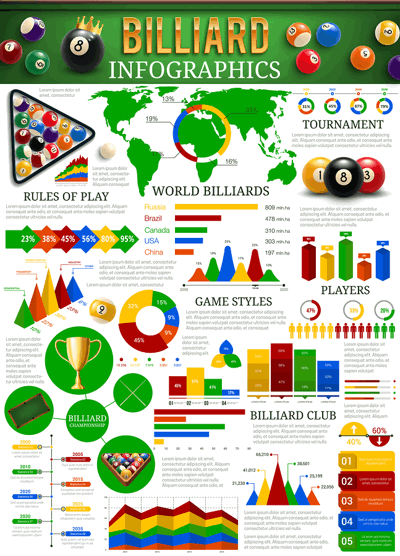 Because of the fact that 9-ball pool is the game used in most competitions in the sport around the world, that’s the one that we’re going to concentrate on here. The game is played with 10 balls that are numbered sequentially, with the exception of the cue ball, which is normally solid white.
Because of the fact that 9-ball pool is the game used in most competitions in the sport around the world, that’s the one that we’re going to concentrate on here. The game is played with 10 balls that are numbered sequentially, with the exception of the cue ball, which is normally solid white.
The 9 balls, which have different colours, are arranged into a diamond shape on the table with the 1 ball at the front of the diamond and the 9 ball in the middle. Usually the rest of the balls are added to the diamond at random, though the placement of the balls on the table should be precise for tournament play. The balls are all supposed to touch at least one of the balls next to them.
The game gets underway when one of the players ‘breaks’ the rack by hitting the cue ball into it. Which player it is that takes this first shot is usually either decided by the players or else determined by the rules of the competition. In some versions, for example, the loser of the previous frame goes first in the next frame, whilst in other variations the winner of the previous frame goes first. Others still just see the players alternating, with the person to go first decided by virtue of a coin toss.
After the break and before the second shot the player who took the break can call for a ‘push out’, which can be called if they have potted a ball, or by the non-breaker if no ball has been potted. A push out allows the player to hit the ball however they want without the possibility of a foul being called as long as the cue ball remains on the table.
Push-out shots being taken end the player’s go at the table and sees possession of the cue ball switching to the other player. The idea behind the push-out is to avoid a situation where by the player next to go is stuck in a situation after the break where a foul is basically unavoidable.
Once the game is underway the idea is to hit the lowest numbered ball on the baize first, then either pocketing a ball or getting one of the balls to any of the rails on the table. Any ball can be potted at any time, so they don’t need to go into the pockets in numerical order, but the lowest ball on the table has to be the first that the cue ball strikes unless a push-out has been invoked.
The first player to pot the 9-ball is the winner and this can happen legally at any point in the game as long as the lowest numbered ball has been hit first. Each player remains in charge of the table until they either commit a foul or wins the game.
Matches are usually played until a set number of games have been won. Often this is something like seven or nine games, though the exact amount is determined either by the players ahead of play or the competition organisers. Equally, different organisations have their own variations of the rules, such as Texas Express.
Equipment
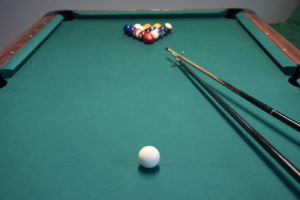 The most important equipment in 9-ball pool is arguably the cue, which tends to be around 58.5 inches in length.
The most important equipment in 9-ball pool is arguably the cue, which tends to be around 58.5 inches in length.
It would be impossible to play the game without a table, of course, which will be between 3.5 feet and 4.5 feet wide and 7 and 9 feet long, with six pockets equally spaced around its edge. It is covered by a baize, which is usually green to denote the grass that the game it derives from was played on.
The balls used in pool tend to be around 2.25 to 2.375 in diameter and normally weigh somewhere in the region of 156 to 170 grams.
The Big 9-Ball Pool Tournaments
| Tournament | Country | Information |
|---|---|---|
| WPA World Nine-ball Championship | Global | Founded in 1990, the competition is split into men’s, women’s and wheelchair categories. It is hosted in Doha, Qatar and has been since 2010 |
| ACUI Collegiate Nine-ball National Championship | United States of America | Created in 1937, this is an amateur championship for college and university students and has offered men’s and women’s tournaments since 1939 |
| The US Open 9-Ball Championship | United States of America | Open to players from all around the world, this tournament officially began in 1976 |
| Women’s U.S. Open | United States of America | The women’s alternative to the US Open 9-Ball Championship |
| Total9ball | United Kingdom | The largest amateur 9-ball tournament in the UK, it has been taking place since 2010 |
As mentioned elsewhere in this piece, there are numerous different variations of pool of which 9-ball is the most popular for competitions. For that reason we’re only going to look at the 9-ball tournaments above.
